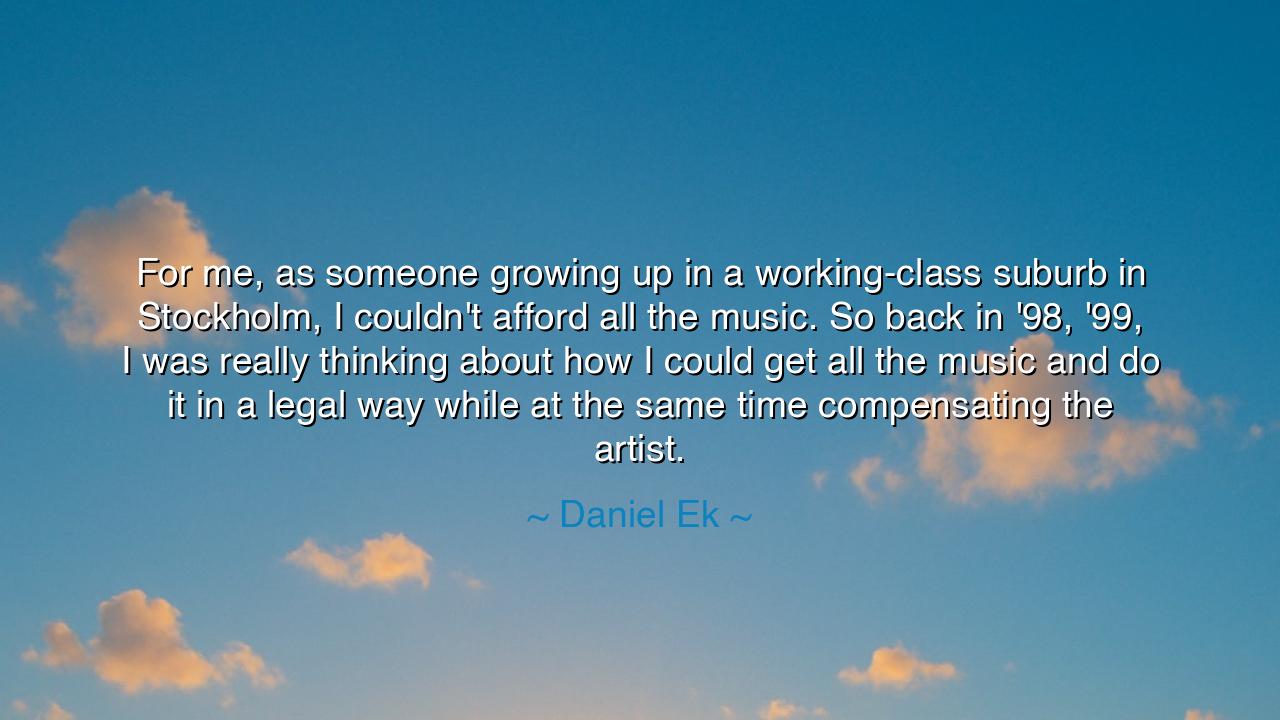
For me, as someone growing up in a working-class suburb in
For me, as someone growing up in a working-class suburb in Stockholm, I couldn't afford all the music. So back in '98, '99, I was really thinking about how I could get all the music and do it in a legal way while at the same time compensating the artist.






Hear the words of Daniel Ek, visionary of sound and seeker of justice: “For me, as someone growing up in a working-class suburb in Stockholm, I couldn’t afford all the music. So back in ’98, ’99, I was really thinking about how I could get all the music and do it in a legal way while at the same time compensating the artist.” These words are not merely the memory of a young man dreaming, but the seed of a revolution that reshaped how humanity listens, shares, and values the art of song.
The meaning of this quote lies first in the hunger of the soul. Music, like bread for the spirit, calls to all people, rich and poor alike. But Ek, raised in a working-class suburb, knew the sting of limits—he could not afford to buy every album, yet the desire for melody and rhythm burned within him. In that yearning was born a question both simple and profound: how could music be made accessible to all, yet still honor those who created it? This question, born of scarcity, became the foundation for Spotify and the transformation of an entire industry.
The origin of this thought is rooted in the turbulence of the late 1990s, when digital technology first made it possible to copy and share music freely. Services like Napster unleashed a flood of songs across the internet, granting access to many but robbing artists of their livelihood. The world was divided between those who wished for free access and those who feared the death of artistry. Ek’s vision was a bridge across this divide: a way to make music abundant and legal, while still ensuring compensation for the creators.
History offers parallels. In the Renaissance, the printing press brought knowledge and scripture into the hands of common people. For centuries, books had been treasures of the elite, chained to libraries, too costly for most to touch. But Gutenberg’s invention spread learning across Europe, igniting reform and revolution. Yet even then, printers and authors wrestled with questions of rights and rewards. The same eternal struggle—how to balance access with fairness—was reborn in the age of digital sound, and Ek stood among those who sought to answer it.
The heart of Ek’s words also reveals a deeper truth: innovation is often born not from wealth, but from longing. It is the child who lacks who imagines new ways to provide. The son of privilege rarely feels the need to transform the world, but the youth who cannot afford what he loves is forced to invent a new path. So it was with Ek: out of the limits of his working-class life came the vision for a platform that would give the world’s music to millions, and in return, millions would give back to the artists who created it.
The lesson for us is clear: every obstacle may become a seed of transformation, if only we approach it with vision. When you feel the pain of scarcity, do not despair—ask instead how you might create abundance. When you see injustice, do not accept it as the way of the world—ask instead how you might restore balance. Ek’s story shows that one person’s dream, born in the quiet of a suburban room, can alter the rhythm of nations.
Practical action lies within our grasp. Support systems that honor both the creators and the community. When you consume—whether music, art, food, or resources—ask how your enjoyment can also bring dignity to the one who provides. Teach the next generation not only to seek abundance, but to seek fairness in abundance. For it is not enough to have; we must also give.
Thus let Daniel Ek’s words be remembered: that from the humblest beginnings, the vision of fairness and access can reshape the world. Music was his battlefield, but the principle is universal. Share widely, honor creators, and seek always the harmony between enjoyment and justice. For in that harmony lies the song of a sustainable future, sung not by one, but by all.






AAdministratorAdministrator
Welcome, honored guests. Please leave a comment, we will respond soon